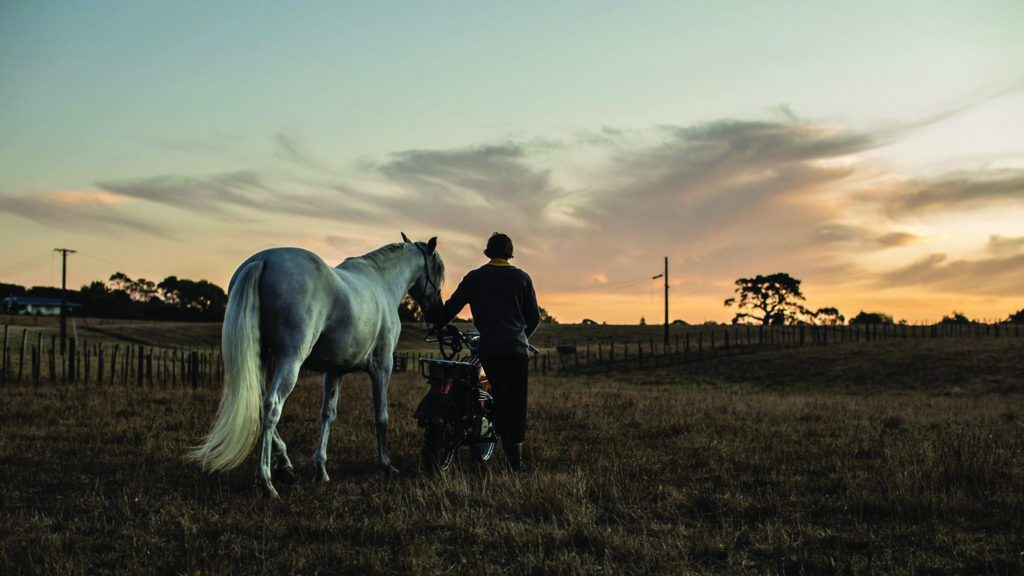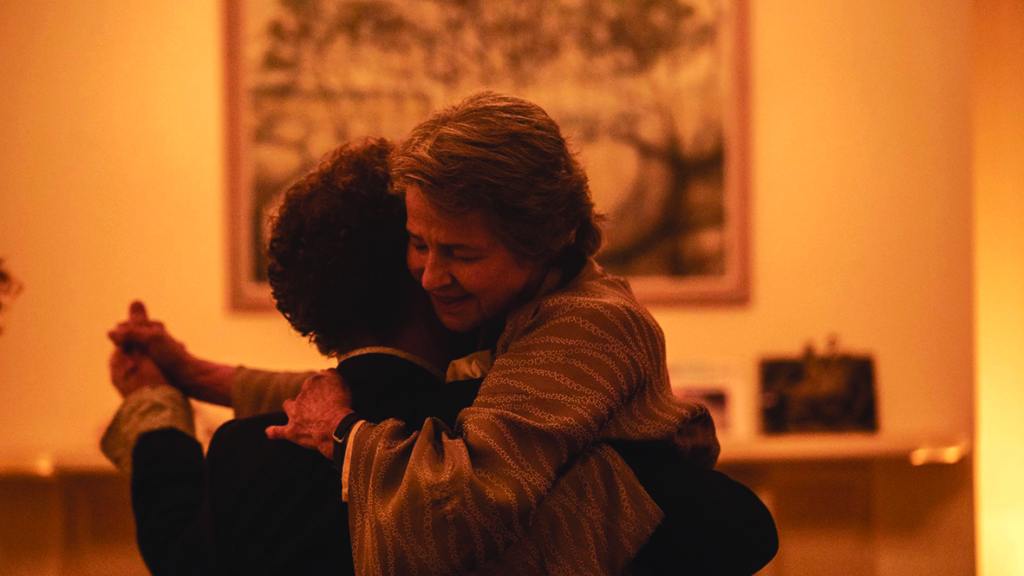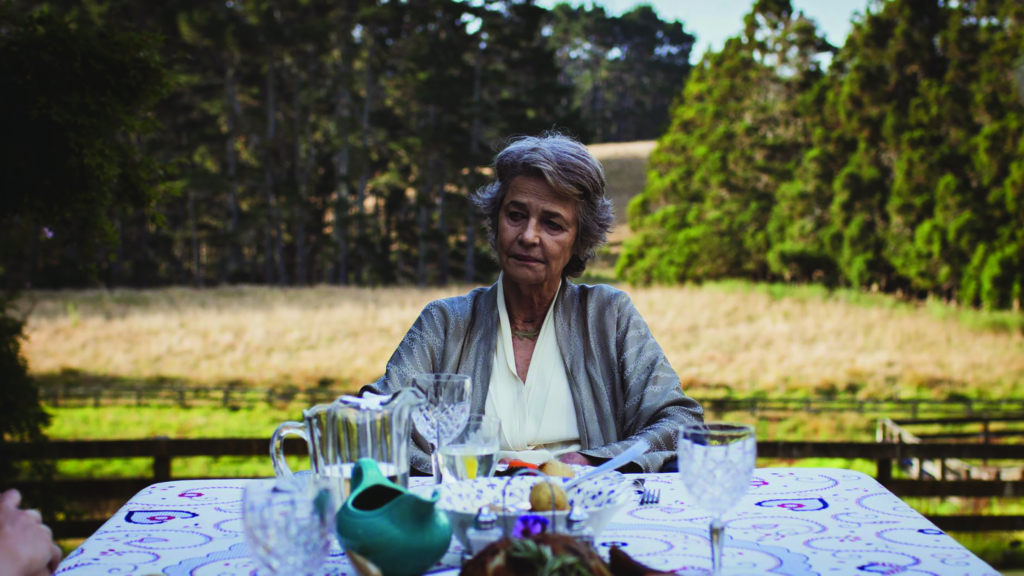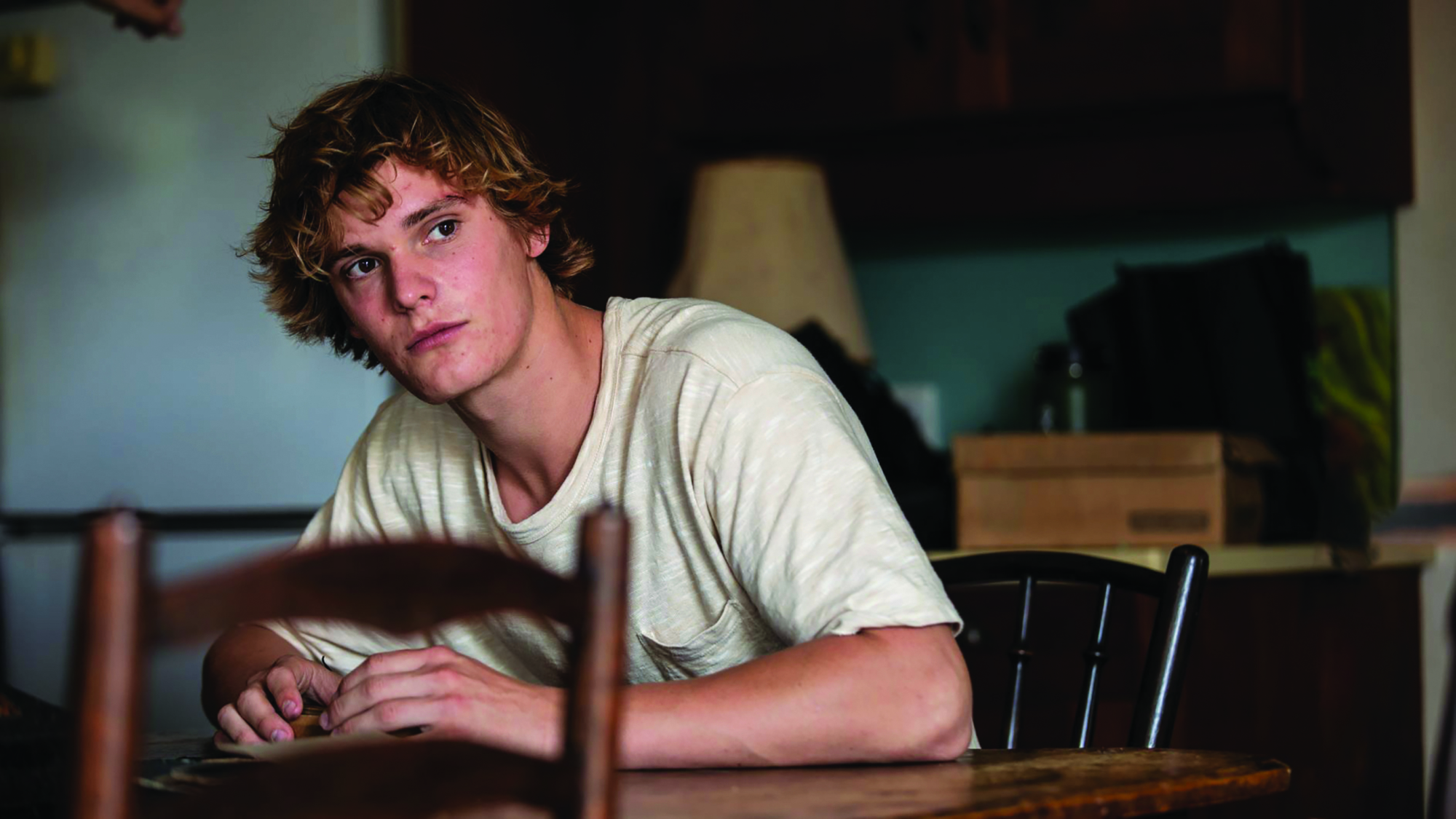The first thing that strikes you about Sam (George Ferrier), the teenage protagonist of writer/director Matthew J Saville’s debut feature Juniper, is how ill-fitting he is. His body seems too large for any space he is in; his features sit in that awkward place between boyhood and manhood; even his clothes are consistently too big for him. Part of this is the reality of puberty, but there’s also intention behind it. Given the choice of clean, fitted clothes or elephantine hand-me-downs, he will go for the hand-me-downs. This isn’t an affectation put on in order to disappear, though; its purpose is right there in his face, his boyish features devoid of facial hair but etched with a hardness, an immovable scowl of anger. He exists as an act of defiance – against his school; against his father, Robert (Marton Csokas); even against the idea of life itself – and the ways he chooses to occupy the world are inherent to that defiance.
Juniper sees Saville – an actor whose credits include a number of major New Zealand television productions – transition to feature writing and directing after helming a couple of shorts. Where many first-time filmmakers suffer from self-consciousness, Saville demonstrates great aptitude with visual storytelling along with a good grasp on both his narrative and his characters, particularly the many astute observations he makes about Sam. In an interview with Radio New Zealand, the director has described his process:
I used examples of my own life and saw how that had made me behave and I sort of delved deep into Sam’s psyche, creating a backstory, creating all these memories, all these moments, trying to do as much research, re-reading the script as much as I can just to get the best grasp on who this guy is.[1]Matthew Saville, quoted in ‘Behind the Scenes of the Movie Juniper’, Nine to Noon,Radio New Zealand, 15 October 2021, <https://www.rnz.co.nz/national/programmes/ninetonoon/audio/2018816522/behind-the-scenes-of-the-movie-juniper>, accessed 16 May 2022.
This verisimilitude becomes integral to the success of the film.

We soon discover two important facts about Sam: the first is that he has recently lost his mother to a terminal illness; and the second is that he has decided to take his own life. He even has a date set: his mother’s birthday, a fitting choice both for its emotional importance and for that particular kind of symbolic theatricality that means so much to us when we are young – an ultimate act of defiance, this time against a significant anniversary associated with great sadness and loss. Among the many sensible decisions made by Saville in his construction of Sam, he doesn’t burden the character with histrionics or give us a monologue wherein he lays out his plans and intentions. Sam is a character defined by his presence and his actions. There’s a certainty to his choices, as certain as his comprehension of his mother’s death – finite, definitive, inevitable.
And then, as in all good dramas, an obstacle appears, in the form of his grandmother Ruth (Charlotte Rampling) – a formidable, cantankerous, gin-soaked harridan whom Sam has never met and had no desire to meet at all. She has come to their family farm in New Zealand for … what? Reconciliation with her estranged son and unknown grandson? A respite while she recovers from a broken leg? An interesting holiday? A chance to cause some chaos? Whatever her reason, for Sam she is a nuisance, disrespectfully occupying the sacred room where his mother died, barking orders and throwing barbed taunts. He wants nothing to do with her, but neither does Robert, whose response to her presence is the same as to that of Sam’s grief: to leave and let the boy deal with it on his own. On an emotional level, Ruth disrupts the careful cycle of misery Sam and his father have created; on a practical one, she’s asking for a refill of her gin cocktail right when Sam is wanting to get on with his plan.

It’s a credit to Saville that, despite the predictability of this set-up – two family members from opposing generations break down their emotional walls by unexpectedly connecting with each other – Juniper never feels as derivative as it threatens to be. It isn’t a film about moving through anger or letting go, but about allowing oneself to sit within it for a moment and actually comprehend it. Ruth is neither the comical grumpy grandmother archetype nor a monstrous, screaming horror, either of which might have felt overly familiar. We know that Rampling can play the latter easily, but she’s far too intelligent for something so simplistic. She sprinkles only a dash of this into her performance, instead moulding Ruth, with a bit of danger and mystery, into something like a sphinx: poised and fascinating, but with an undercurrent of potential menace.
What Ruth offers to Sam is the first person to look him dead in the eyes, to match his defiance with her own, sharpened by decades of resentment and frustration. She describes her interactions with her grandson as a kind of game, perhaps even a duel. She assumes she will be victorious, but such a victory is only satisfying when one has an opponent to match. Not only is Sam the first person in a long time to spar with her with equivalent venom, but, crucially, Ruth is the first person in a long time willing to put in the effort to fight back against him. In an early scene, she lobs a glass straight at his head. The glass misses and shatters, but Sam holds his ground; he offers to stand still to make it easier for her, expecting Ruth to back down. She doesn’t: another glass is thrown, striking his forehead. He looks at her with a mix of fury and disbelief, and she looks back without remorse. It’s an extraordinary, shocking moment, perhaps the linchpin of the film: the instant in which these two combatants finally show the extent to which they are willing to both fight and suffer.

This pain threshold will guide the building relationship between Sam and Ruth. Our standard response to young people in pain is to tell them that everything will be okay and hope that turns out be true. This is the tactic with Sam taken by Robert, who is as hopeful for himself as he is for his son; but that ‘okay’ comes with set parameters as defined by the father. The process requires peace and quiet, which includes sending Sam off to boarding school, physically isolating him right when he needs home and family – something that Robert doesn’t believe he can provide. Saying that ‘all will be okay in the future’ is not helpful in dealing with the now, with the present pain, however; Sam’s grief has to combat not only the fact that young men are conditioned to bury or set aside any kind of emotion, but also that the guiding star for his grief, his father, is mostly absent from his life. Sam’s need for destruction – of property and relationships as well as of himself – allows him to manifest his pain into something comprehensible, tangible and concrete.
Ruth is engaged in the same pursuit in many ways, though Saville only gives us glimpses into where her anger comes from. It swirls in her endless glasses of gin (half pure gin, half water, never further watered down). Unlike Sam, whose anger is fresh and all-consuming, hers is settled and controlled: a thick coat of armour. What she offers Sam is the possibility of having that anger acknowledged. Rather than saying things will be okay, Ruth agrees that, right now, at this moment in time, things are pretty bad – and that the end, while likely, isn’t yet in sight. In her interactions with her grandson, she offers chaos, breaking the rules, letting off steam. Once that glass is thrown, once they have delivered their most savage blows to one another, there’s an unspoken language between them – an understanding that each sees the pain of the other and their commonality, even if neither will openly admit what that pain is. Sam and Ruth have no patience for the stupidity of the world around them, and being together makes that shared frustration less lonely.

Much of the power of Juniper lies in the need to be seen – not just as who you are, but also as who you are capable of being. For young men, who tend to be less likely to seek help in a mental health crisis,[2]See headspace National Youth Mental Health Foundation, ‘Clinical Toolkit – At-risk Group: Young Men’, <https://headspace.org.au/assets/clinical-toolkit/CT-At-Risk-Young-Men.pdf>, accessed 17 May 2022. it can be life-changing to have someone first acknowledge their pain and then acknowledge their need to respond to it. Ruth does so, but she also teaches Sam that the energy of defiance needs to be put to good use: you can have a party (against your father’s wishes), for instance, but clean the garden first. Through this guidance, his anger can, rather than dominate his life, help reshape it in a healthy way and rebuild his sense of identity – the loss of his mother thus becoming a force for positive change instead of a path to self-destruction. Ruth’s language of chaos matches Sam’s own, using the symbols and rituals that matter to him. The party becomes a test of whether Sam is capable of funnelling his despair into healthy release, without destruction; Ruth and her devoted nurse, Sarah (Edith Poor), become facilitators of this test, watching from the sidelines, prepared to step in if necessary.
Saville’s visual storytelling is often stronger than his writing, with lush and melancholy visuals set amid the crumbling farm Sam and his father occupy. The metaphor of the transition of the seasons is ever present in Martyn Williams’ cinematography, with the sun seeming to break through the gloom more and more as Sam’s and Ruth’s armour cracks. The beauty of the filmmaking and the strength of the narrative highlight some of the flaws in the film’s script, in which extraneous dialogue has been stripped so far back that conversations between characters are defined by straightforward questions and answers robbed of subtext. Csokas suffers most from this as Robert, more a sketch of a grieving father than a fully rounded character. Thankfully, Saville’s instincts are spot-on with Rampling and Ferrier. There’s an indelible chemistry and great affection between the two actors, translating as a beautiful sense of trust – necessary when the young newcomer spends much of the film physically carrying his legendary co-star. Even when the dialogue veers towards the obvious, their natural connection wins out.

The party represents another turning point for Sam, in which his relationship with Ruth reaches its peak and the responsibility of care shifts. With her health failing rapidly, Sam is placed once again in the position of carer for a loved one; but he is now older, harder and wiser. Guilt forms the backbone of his despair – that devastating tendency that young people have of carrying the full weight of responsibility for circumstances they are in no way prepared to deal with. Again, this narrative shift in Juniper seems inevitable in the wake of the many similar films that have come before it, but Saville uses Ruth’s turn to serve the film’s thematic integrity and guide the lessons his young male protagonist must learn. Now, Sam is given the opportunity to jettison his grief, to make amends and to be the man he desperately wished he was. This is another aspect of the ‘everything will be okay’ line trotted out in times of crisis: things will probably be okay eventually, but pain may also return in new forms; the pain you feel now is preparation for the pain to come. This is not a nihilistic message; rather, the film suggests, to learn from the present gives us the tools to live on. For Sam, what Ruth offers – with her delicious barbs, and her chaotic twinkle – is a chance for him to understand the lessons in front of him and to prepare for his final steps towards adulthood.
Shimmering with compassion and humanity, Juniper is a careful meditation on what it is to live, to grow old, to die, to lose, to feel pain and to love. The film’s simplicity is its greatest asset, both for demonstrating Saville’s obvious skill as a filmmaker and for allowing us as viewers the chance to see ourselves in the considerable – yet relatable – plight of this angry young man and his equally angry grandmother. Sometimes just getting on with your day isn’t enough when your heart is breaking; sometimes you need one strong drink and a heavy glass to shatter against the wall first.
Endnotes
| 1 | Matthew Saville, quoted in ‘Behind the Scenes of the Movie Juniper’, Nine to Noon,Radio New Zealand, 15 October 2021, <https://www.rnz.co.nz/national/programmes/ninetonoon/audio/2018816522/behind-the-scenes-of-the-movie-juniper>, accessed 16 May 2022. |
|---|---|
| 2 | See headspace National Youth Mental Health Foundation, ‘Clinical Toolkit – At-risk Group: Young Men’, <https://headspace.org.au/assets/clinical-toolkit/CT-At-Risk-Young-Men.pdf>, accessed 17 May 2022. |





